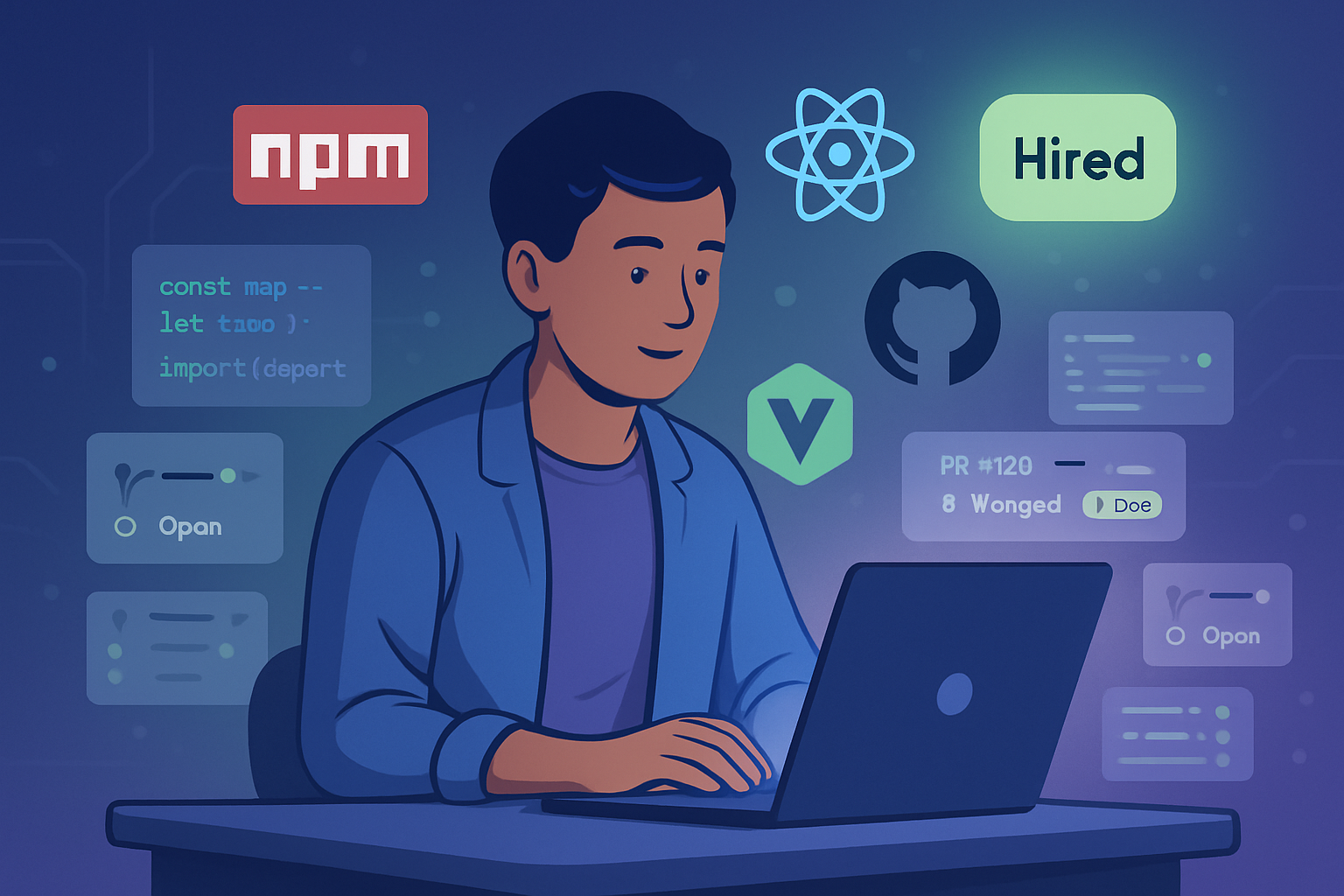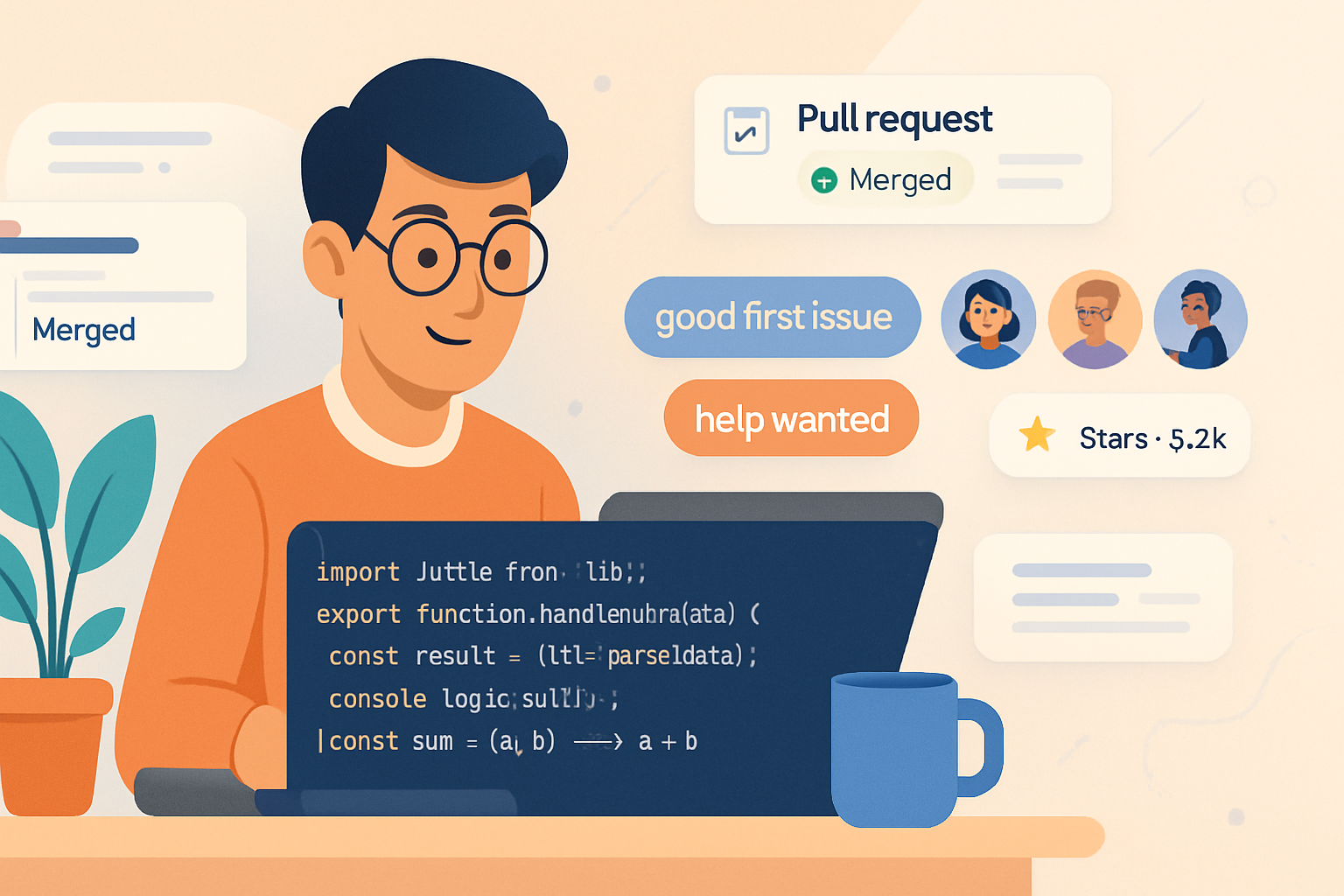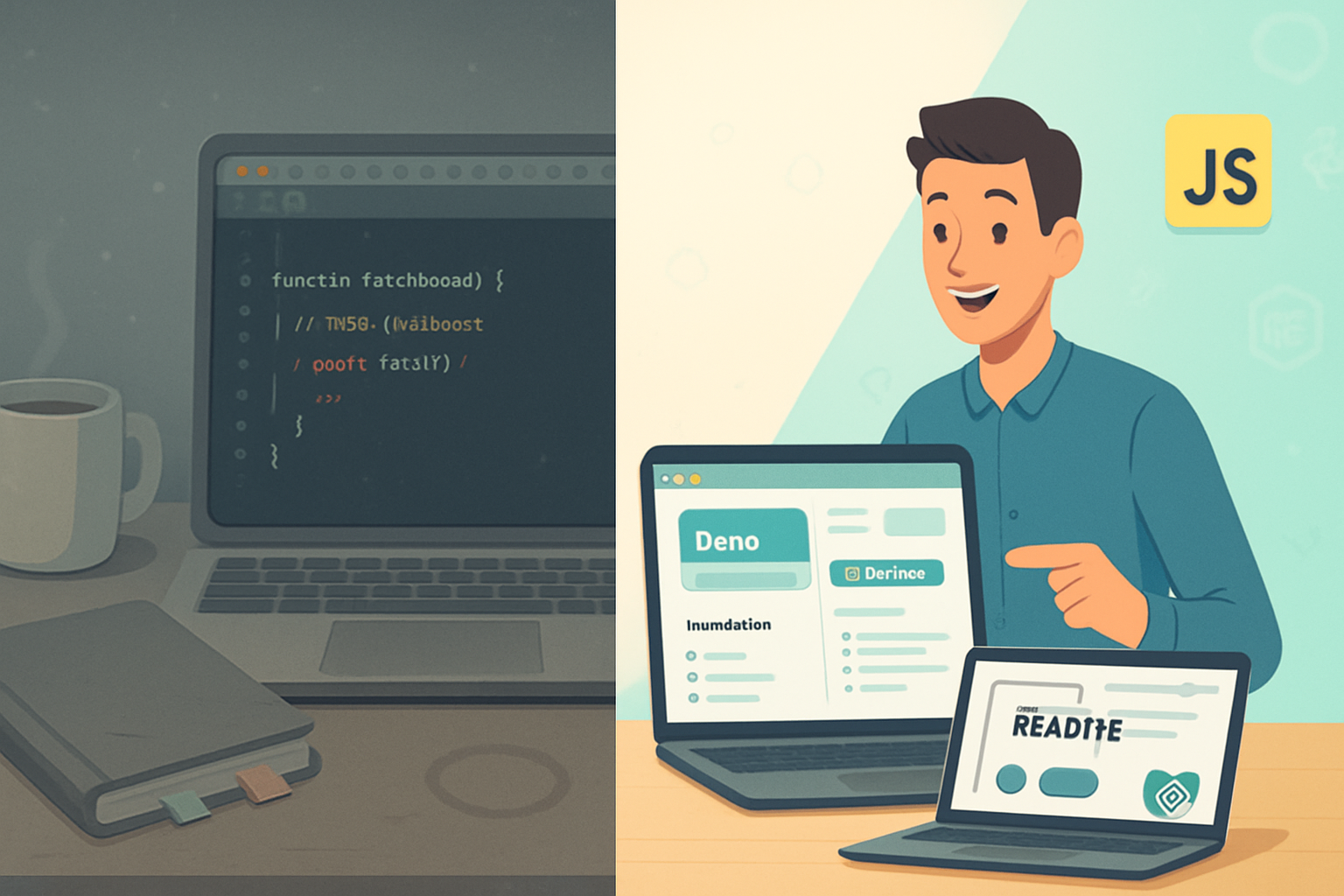· career · 6 min read
The Hidden Career Benefits of Contributing to Open Source JavaScript Projects
Contributing to open source JavaScript projects can do more for your career than a polished resume. Learn how contributions translate to job offers, real-case success stories, and a practical plan to turn PRs into career momentum.

What you can achieve by the end of this article
You can turn open source contributions into a career engine: a visible portfolio, interview ammunition, networking opportunities, and - yes - a path to job offers and promotions. Read on and you’ll learn why that happens, see real examples of developers whose OSS work changed their career trajectories, and get a step-by-step plan to make contributions that matter.
Why open source is a career accelerator (short answer)
Open source is proof. It’s verifiable, public evidence of your technical skills, communication, and judgment. Recruiters and hiring managers love it because it reduces hiring risk. Contributions show you can: ship code, collaborate across time zones, write maintainable code, and handle feedback.
Longer answer: beyond code, open source gives you a reputation, real-world product experience, and a network of peers (and potential employers) who observe your work over time. Companies increasingly look for contributors when hiring - and contributors increasingly get offers because they’ve already demonstrated value in an environment similar to the workplace.
(For broader industry data, see GitHub’s State of the Octoverse and Stack Overflow’s developer surveys.)
- GitHub Octoverse: https://github.blog/changelog/2021-10-06-state-of-the-octoverse-2021/
- Stack Overflow Developer Survey: https://insights.stackoverflow.com/survey
The specific career benefits of contributing to JavaScript OSS
Portfolio that actually works
- Your GitHub repo is a live, searchable resume. Anyone can see your code and the problems you solve.
- A string of good PRs demonstrates sustained output - far better than a single project on your laptop.
Real technical interview prep
- Working on libraries/frameworks exposes you to API design, performance trade-offs, and testing patterns that interviewers ask about.
Better job matches and inbound opportunities
- Companies often reach out to contributors they respect. You don’t have to apply cold; you get noticed.
Credibility and thought leadership
- Writing docs, RFCs, or blog posts about your contributions positions you as a domain expert.
Faster promotions and internal mobility
- Employers value people who’ve shown initiative and can lead across teams. Maintainers or frequent contributors often get promoted into technical leadership roles.
Negotiation leverage
- A public body of work strengthens your compensation negotiations. It’s concrete evidence of impact.
Soft skills that matter
- Code review, issue triage, and cross-team coordination sharpen communication - which is how senior engineers differentiate themselves.
Real-life success stories (what actually happened)
Below are three publicly visible examples that show distinct ways OSS can change a career.
Dan Abramov - from side project to React core team
Dan authored Redux, a small library that solved a concrete state-management problem for React apps. Redux became widely adopted, and the visibility and credibility it brought helped Dan join the React team at Meta (Facebook). Dan uses his blog and repository to explain design choices and share learnings - which further multiplied his reach.
- Dan Abramov’s blog: https://overreacted.io/
Why it matters: a focused, well-designed library can act as both a technical portfolio and a long-term signal of your problem-solving approach.
Sindre Sorhus - prolific maintainer to sustainable career
Sindre is one of the most prolific JavaScript open-source maintainers. He maintains hundreds of npm packages and has shown that sustained OSS work can become a professional path - through sponsorships, consulting opportunities, and recognition.
- Sindre Sorhus GitHub: https://github.com/sindresorhus
Why it matters: breadth and consistency can lead to sponsorships, offers, and the option to prioritize OSS full-time.
A developer who got hired after contributing to a company repo (composite but common)
Many developers have published posts titled “How contributing to open source helped me land my first job”. Contributing to a company-maintained open-source repo - even with one well-written PR - often leads to direct recruiter contact because you’ve demonstrated that you can work with that team’s codebase.
- Example story: freeCodeCamp article - https://www.freecodecamp.org/news/how-contributing-to-open-source-helped-me-land-my-first-dev-job/
Why it matters: targeted contributions to companies or projects you want to work with create highly relevant callbacks.
How to contribute in ways that maximize career impact (practical, JavaScript-focused)
Choose projects strategically
- Pick repositories that align with where you want to work (frameworks, tools, infra). If you want to work on front-end performance, contribute to React tooling or Lighthouse plugins.
- Look for projects with active maintainers and clear contribution guidelines.
Start small, aim for quality
- Fix a bug, improve docs, add tests. Small PRs that are easy to review are accepted faster and still show value.
Solve a painful problem, then share the story
- If a tiny change saved you an hour a week, write a short PR description or a mini blog post explaining why. That context communicates thoughtfulness.
Focus on clear communication
- Good commit messages, a helpful PR description, and a respectful tone in code review matter as much as code.
Learn the codebase tools (TypeScript, CSR/SSR, bundlers)
- JavaScript ecosystems emphasize tooling. Show you can work with TypeScript definitions, configure rollups/webpack, or write Jest tests.
Go beyond code: docs, examples, and dev experience
- Many maintainers value documentation, examples, and DX improvements - these are high-impact, low-barrier contributions.
Build a visible story
- Link to your contributions from your resume and LinkedIn. Add a short note on the impact and your role for each notable PR.
Be consistent
- Consistency beats bursts. A series of small, regular contributions is more convincing than a single big win.
What hiring teams actually look for (translate contributions into interview signals)
- Problem selection: Do you pick meaningful issues or only trivial ones?
- Code quality: Are your changes well-tested and documented?
- Collaboration: How you respond to review feedback.
- Ownership: Do you shepherd a change from idea through release?
When you prepare for interviews, map your contributions to these signals. Be ready to walk through a PR like a case study: the problem, trade-offs, alternatives you considered, and the outcome.
A 30/60/90 plan to convert contributions into career momentum
30 days
- Find 2–3 active JavaScript repositories (pick one related to your job target).
- Make small contributions: doc fixes, tests, one bug fix.
- Update your GitHub profile with pinned repos.
60 days
- Land 3–5 accepted PRs with meaningful descriptions.
- Write a short blog post or LinkedIn post explaining one non-trivial contribution.
- Start engaging in issue discussions to show voice and context.
90 days
- Own a larger change or feature (or maintain a small project for a module).
- Reach out to maintainers or contributors for mentorship or informal chat.
- Add a “Selected Open Source Contributions” section to your resume and LinkedIn with links and short impact notes.
Pitfalls and how to avoid them
- Burnout - open source is volunteer labor. Set boundaries and avoid overcommitting.
- Scope creep - avoid promising major rewrites in a first PR. Instead, propose and iterate.
- Toxic maintainers - leave and find healthier projects; one bad experience isn’t the whole ecosystem.
- Overfocusing on stars - pick projects that teach you relevant skills, not only popular ones.
Final thoughts - why this path is worth it
Contributing to open source isn’t just altruistic. It’s strategic career-building. You get portable proof of competence, real product experience, and a network that recognizes your work. Start small. Be consistent. Tell the story of your contributions.
Do that and recruiters will notice. Hiring managers will too. Your next promotion or dream role might begin with a single, well-crafted pull request.
References & further reading
- GitHub: State of the Octoverse - https://github.blog/changelog/2021-10-06-state-of-the-octoverse-2021/
- Stack Overflow Developer Survey - https://insights.stackoverflow.com/survey
- freeCodeCamp story: How contributing to open source helped one developer land a job - https://www.freecodecamp.org/news/how-contributing-to-open-source-helped-me-land-my-first-dev-job/
- Open Source Guides - How to Contribute - https://opensource.guide/how-to-contribute/
- Dan Abramov’s blog (Overreacted) - https://overreacted.io/
- Sindre Sorhus GitHub - https://github.com/sindresorhus



